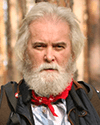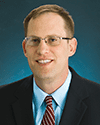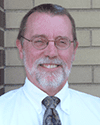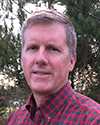Share this article
2017 TWS Council candidates announced
The Nominating Committee of The Wildlife Society announces the candidates for upcoming vacancies on TWS Council. Additional nominees for these positions may be submitted by any Voting Member in good standing, if supported in writing by 5 percent of the Voting Membership. The deadline for additional nominations is May 22.
Electronic ballots will be sent June 2 to all members with an email address. If you do not have an email address, you will receive a mail ballot. Voting will close July 3.
Newly elected members of TWS Council will be installed at the 24th Annual Conference, Sept. 23-27, 2017 in Albuquerque, New Mexico.
Candidate statements are provided below. You can also view all candidates’ bios by clicking here.
Vice President Nominees
Shane Mahoney
 I have been associated with the Wildlife Society since 1996 when I gave my first presentation to members at the Northeast Section annual meeting. Over the course of many years and many engagements I have watched the Society develop into an organization that has a true leadership role in North American conservation and has increasing capacity to meaningfully contribute to international issues. The Society’s diverse membership, its commitment to science-based approaches to conservation, and its ongoing efforts to communicate with and inspire its community of young students, established professionals and leading researchers, as well as the wider public, collectively represent for me an engine of power and vitality in the race for conservation solutions. With my current roles and partnerships within major international conservation organizations such as the IUCN I believe I can assist in helping TWS achieve even greater influence and impact for conservation.
I have been associated with the Wildlife Society since 1996 when I gave my first presentation to members at the Northeast Section annual meeting. Over the course of many years and many engagements I have watched the Society develop into an organization that has a true leadership role in North American conservation and has increasing capacity to meaningfully contribute to international issues. The Society’s diverse membership, its commitment to science-based approaches to conservation, and its ongoing efforts to communicate with and inspire its community of young students, established professionals and leading researchers, as well as the wider public, collectively represent for me an engine of power and vitality in the race for conservation solutions. With my current roles and partnerships within major international conservation organizations such as the IUCN I believe I can assist in helping TWS achieve even greater influence and impact for conservation.
And never in my experience have we more desperately needed artful dedication to this cause, insightful pursuit of knowledge and the passionate commitment to dialogue centering upon wildlife and the challenges nature faces. For me, these are all things the Wildlife Society represents. The planet is at a crossroads and conservation at a turning point, increasingly overwhelmed by humanity’s hunger for resources. In North America we have had great conservation success and thus inherit great responsibility to forge and support leading models for conservation science, law and policy, at home and abroad.
Thus, it is this combination of critical need and escalating relevance and capacity that have encouraged my decision to run for the office of TWS Vice President. I believe in this organization and in its potential to influence conservation’s future. I want to play as much a role in this as I can and to serve in greater capacity than I have. Conservation is, after all, about service. To the greatest extent I can, I want to help guide and hopefully inspire TWS to become an even more influential and more widely recognized and better supported wildlife organization. It would be an honor to have such an opportunity.
Gary White
 Representing the Central Mountain and Plains Section on Council was a time-consuming task that with my emancipation from Colorado State University as a full-time faculty member in June, 2007, I welcomed for 2 3-year terms. Prior to my retirement, my schedule did not allow me to attend the numerous chapter meetings around the section, nor the 2 Council meetings each year. I attended 35 of the possible 42 state chapter meetings in the CMPS during my 6 years on Council. Chapter and Section meetings have given me the chance to hear what the membership is thinking about TWS. Thus, I am well aware of the huge time commitment if elected to the Vice-President of TWS, but am prepared to once again allocate this time.
Representing the Central Mountain and Plains Section on Council was a time-consuming task that with my emancipation from Colorado State University as a full-time faculty member in June, 2007, I welcomed for 2 3-year terms. Prior to my retirement, my schedule did not allow me to attend the numerous chapter meetings around the section, nor the 2 Council meetings each year. I attended 35 of the possible 42 state chapter meetings in the CMPS during my 6 years on Council. Chapter and Section meetings have given me the chance to hear what the membership is thinking about TWS. Thus, I am well aware of the huge time commitment if elected to the Vice-President of TWS, but am prepared to once again allocate this time.
I have been a stalwart supporter of bringing TWS into the electronic age, and will continue to support and push for these changes. I continually encourage Chapters to maintain and update their web sites (I have been webmaster for 4 TWS sites, and currently the Biometrics Working Group web site). Distribution of scientific knowledge is one of the primary functions of our professional society, and the electronic library is no longer a futuristic dream. I promoted the re-establishment of the Wildlife Society Bulletin as an electronic journal, which Council approved in 2010.
I also fully back the following topics:
- Women and minorities in the wildlife profession – TWS needs the diversity
- Conservation Affairs Network – TWS should be the provider of scientific information in the wildlife arena
- Additional funding for wildlife management through to re-energizing the CARA initiative, although unlikely in the current political climate.
Most importantly, one of the primary sources of monetary support for TWS has traditionally been our peer-reviewed journals and published books. With the continued increase in open-access journals and electronic books, this source of revenue is going to degenerate. I believe I understand better than most TWS members how critical this situation will become, and would actively promote solutions.
In conclusion, I have been active in TWS since my graduate student days, and have attended numerous TWS Council meetings as an observer through the years. Many of my graduate school mentors served as President of TWS, as have many of my professional colleagues. I have an appreciation of the last 40 years of history of TWS, and hence have a sense of what has worked, what has not worked, and I will bring this knowledge to bear on the future decisions facing TWS. My views typically fall in the middle of the range of views within this Society – from the more traditional attitudes of the SE Section to the futuristic views of the Western Section.
Central Mountains and Plains Section Representative Nominees
Bob Lanka
 I have had the distinct honor of serving as Central Mountains and Plains Section Representative to The Wildlife Society Council since October 2014. Since then, with the incredibly generous support of my employer the Wyoming Game and Fish Department, I have been able to attend State Chapter meetings in all the states within our Section at least once. The opportunity to meet and get to know members from State and Student Chapters across our Section has been one of the highlights of my professional career. To each of you, but particularly to those of you who have chosen to step up and volunteer to serve our professional society, The Wildlife Society, in leadership and support roles I say THANK YOU.
I have had the distinct honor of serving as Central Mountains and Plains Section Representative to The Wildlife Society Council since October 2014. Since then, with the incredibly generous support of my employer the Wyoming Game and Fish Department, I have been able to attend State Chapter meetings in all the states within our Section at least once. The opportunity to meet and get to know members from State and Student Chapters across our Section has been one of the highlights of my professional career. To each of you, but particularly to those of you who have chosen to step up and volunteer to serve our professional society, The Wildlife Society, in leadership and support roles I say THANK YOU.
It has been a privilege to serve our professional society at the Wyoming State Chapter and Central Mountains and Plains Section levels and now as a member of TWS Council. I must admit I have enjoyed the work of Council and getting to know the incredible people that serve on Council as well as TWS Staff. My work on Council has benefited greatly from your willingness to share your ideas and views with me. If reelected, I want to continue to work with you to ensure that each of your membership dollars is spent efficiently and wisely, to enhance the relationship between the Society and Section, State and Student Chapters, to increase the relevance of the Society to the many State Chapter members who are not members of the Society, to enhance TWS publications so that they better meet the needs of research scientists and managers, to help focus policy work and to continue Society efforts to encourage student and early career professionals to become life-long members of our Society and leaders in our profession. Thank you for your consideration.
Adam Ahlers
 The Wildlife Society (TWS) has become a leader in advancing biodiversity conservation efforts through active engagement with numerous working groups and committees at the national, regional and state levels. Additionally, TWS is an important organization that has wide-reaching benefits for field biologists, policy makers, academics, and students. For our TWS initiatives to remain effective, individual membership and active participation is critical.
The Wildlife Society (TWS) has become a leader in advancing biodiversity conservation efforts through active engagement with numerous working groups and committees at the national, regional and state levels. Additionally, TWS is an important organization that has wide-reaching benefits for field biologists, policy makers, academics, and students. For our TWS initiatives to remain effective, individual membership and active participation is critical.
If elected as the CMPS representative, I would work to find ways to actively engage young professionals and college students in the TWS mission. Although basic membership is critical for TWS (i.e., the number of people paying dues each year), active membership (e.g., number of people participating in working groups or committees) is likely more important for ensuring our collective success. My own participation in TWS as a young professional and student has been extremely rewarding and hopefully a good long-term investment for TWS. I wish to help other early career biologists and college students realize their potential as effective wildlife professionals and as engaged members of TWS.
Northeast Section Representative Nominees
Paul Johansen
 It has been my greatest professional honor to serve as your Northeast Section Representative to The Wildlife Society. With strong support from The Wildlife Society, the Northeast Section has demonstrated a continued commitment to address the professional needs of dedicated wildlife managers, educators, researchers and administrators throughout the region. Working together, we can continue to meet the challenges and opportunities that face our natural resources and the users of these valuable resources.
It has been my greatest professional honor to serve as your Northeast Section Representative to The Wildlife Society. With strong support from The Wildlife Society, the Northeast Section has demonstrated a continued commitment to address the professional needs of dedicated wildlife managers, educators, researchers and administrators throughout the region. Working together, we can continue to meet the challenges and opportunities that face our natural resources and the users of these valuable resources.
In today’s changing society, it is imperative that the wildlife profession be prepared to address a wide range of issues and concerns (e.g., limited operating budgets, growing anti-management sentiment among various segments of the public, threats undermining the North American Model of Wildlife Conservation, climate change impacts, accelerated habitat degradation, impending retirements that will result in the loss of institutional knowledge, etc.). The Wildlife Society is well positioned to assist the wildlife profession, as we attempt to address many of these challenges. By adopting an effective and business-like approach to management, The Wildlife Society continues to improve its scientific and technical publications, networking and information dissemination capabilities, wildlife policy activities and other programs designed to support its membership in all areas of wildlife conservation, research and management. I fully endorse these initiatives, recognize their importance to our profession and pledge to explore additional means for improving organizational effectiveness and program delivery to our membership.
I am proud to be a member of The Wildlife Society, the Northeast Section and the West Virginia Chapter. Council strives to demonstrate excellent leadership skills and commitment to the resources we all value. Should I be reelected to this office, I will attempt to continue this fine tradition and serve to the best of my ability.
Duane Diefenbach
 I have been active in The Wildlife Society throughout my career and have always considered it the organization that represents my professional and personal interests with respect to the conservation of wildlife and wild places. I have been active in the leadership at the state and regional levels of TWS, and would like to be involved in leadership at the national level.
I have been active in The Wildlife Society throughout my career and have always considered it the organization that represents my professional and personal interests with respect to the conservation of wildlife and wild places. I have been active in the leadership at the state and regional levels of TWS, and would like to be involved in leadership at the national level.
The Wildlife Society exists to help wildlife professionals conserve and manage wildlife and wild places and I see that being accomplished by providing support to all members (at whatever career stage they may be) through a variety means (e.g., networking, mentoring, continuing education). Also, many wildlife professionals are employed by government agencies and so TWS becomes their voice advocating for the use of science-based information in developing public policy. I think TWS has made great strides toward its mission over the past 5-10 years and is firmly established to continue to make continued progress.
My career has been in both research and management, and I would like to see TWS further help integrate these two aspects of the wildlife profession. Doing so will help us learn faster and make better management decisions, and make sure our limited resources are most effective at gaining a better understanding of the systems we manage. In the wildlife profession we are commonly taking actions that could be used as “experiments.” I would like to see TWS take a greater role in developing the tools and skills for integrating research and management so we can make the most of the experimental nature of our profession.
Header Image: ©Steve Hillebrand/USFWS








